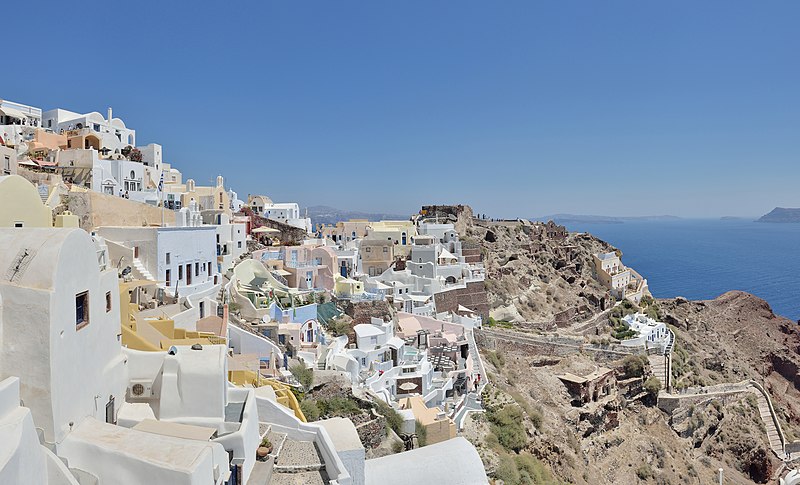
‘On an island in the sun’
‘We’ll be playing and having fun’
The American rock band Weezer is right in that there is fun to be had basking in the sunshine on a beach. But there is more to the idea of travel and tourism than high UVs and sandy coastlines.
Overtourism has appeared in news headlines continuously this summer; the idea that mass influxes of tourists are changing areas for the worse. When the negative impacts of tourism outweigh the positives for local residents and host countries this is when overtourism becomes a prominent issue.
Cases of overtourism have been cropping up all over Europe. From the overpriced towns in Malaga to the fear of environmental destruction in Norway, the impacts of tourists are widespread.
“When the negative impacts of tourism outweigh the positives for local residents and host countries this is when overtourism becomes a prominent issue.”
Due to the blazing temperatures of southern Europe, many tourists have recently been looking for cooler destinations. Innovation Norway, owned by the Norwegian state, had their campaign promoting the country as an outdoor activity hotspot suspended following criticism that mass tourism could bring significant environmental impacts. Pressure on the environment could increase due to unregulated traffic and camping, littering, and more search and rescue operations.
Norwegians have a legal right to partake in outdoor activities (such as hiking and camping) anywhere irrespective of land ownership, and this is a foundation for the country’s outdoor culture. This initiative was hoping to give tourists the same privileges in a hope to bring more people closer to nature and explore Norway’s unique landscapes.
Despite tourism boards wanting to capitalise on this influx of tourists into the north of Europe, they recognised that caution should be taken. The CEO of tourism board Fjord Norway, Stein Ove Rolland commented that tourism needs to be in a ‘well-organised, sustainable’ manner to ensure nature can be ‘enjoyed by locals and visitors’ now and in the future. Dag Terje Klarp Solvang, the general secretary of the Norwegian Trekking Association, noted that hiking is a sustainable outdoor activity that tourists could enjoy.
Local residents in Malaga and across Spain have taken to the streets to protest against the housing prices, huge crowds, and gentrification that has resulted from overtourism. Banners have been hung up across Barcelona displaying phrases such as ‘tourists go home’.
“Tourism brings positive economic activity and was a significant component to Spain’s resurgence after the pandemic. Yet many Spaniards have been priced out of their city, with more infrastructure befitting tourists rather than locals.”
Spain, like many other European nations, has a large proportion of the economy represented by the tourism industry; for Spain, it makes up 13% of its GDP. Tourism brings positive economic activity and was a significant component to Spain’s resurgence after the pandemic.
Yet many Spaniards have been priced out of their city, with more infrastructure befitting tourists rather than locals. Chain restaurants have replaced family-led businesses. Rental apartments have replaced homes.
‘City models only focus on tourism’ which is detrimental to the ‘heterogeneity of the cities’ comments urban planner Kike Espana. Protesters stress that they are not opposed to tourism, but rather the way it is managed. This calls for centralised governmental action. A tourist tax is already in place in Catalonia and the Balearic Islands. Barcelona intends to revoke all tourist accommodation licences, and Palma de Mallorca is beginning to limit the number of sea arrivals to no more than three cruise liners a day.
Cruise ship restriction is also a method being adopted by the Greek government. Greece is in the top 10 for the world’s most popular holiday destination, and tourism minister Olga Kefalogianni claims the goal is to become the ‘global tourism power’. Yet this mindset of continuous capital growth cannot proceed. Like in other instances around Europe, overtourism is a threat to local livelihoods as well as the environment.
Santorini for example is at the forefront of global heating. This coupled with the reduced average rainfall creates a potential for catastrophic pressure on water resources and infrastructure. Amid the overtourism crisis, which the mayor of Santorini emphasises is as big of a threat as the climate emergency, there is an ongoing construction spree. The mayor further expresses his concern; the island’s natural landscape is the foundation for tourism in Santorini. If this is destroyed, then it destroys ‘the very reason people come [to Santorini]’.
The runaway developments are directly correlated with the record numbers visiting the island. Greece aims to attract almost 40 million tourists by 2028, which is 4x the size of the total population. But even now there is overcrowding of narrow lanes in cliff top towns, such as 17,000 people filing through the town Fira every day. Meanwhile fragile ecosystems are reaching a point of no return. Unsurprisingly, Greeks have also protested for more government intervention to halt overtourism.
“Greece aims to attract almost 40 million tourists by 2028, which is 4x the size of the total population.”
Authorities around Europe have been held accountable for the surge in tourists visiting their cities, with acts of protest sprouting across various places. The message from local residents is clear; it is a plea to have focus redirected away from tourists and towards local people. Foreign owned businesses area raking up housing prices, tourists have homogenised towns to suit their tastes, and landscapes are becoming urbanised to meet the demand.
Whilst tourists have their part to play in being a sustainable member of the community when visiting, governments and their profit-driven initiatives also play a part in facilitating overtourism. If overtourism isn’t curbed, both negative environmental and social impacts of tourism will be far more tangible.

